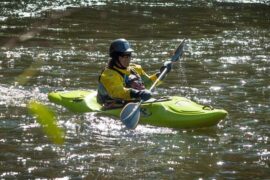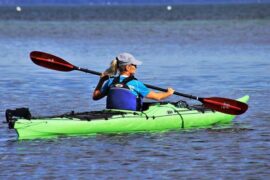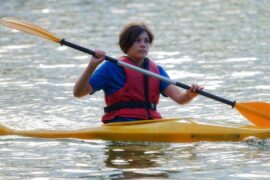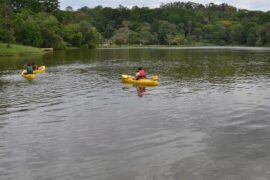Whether peddling on secured coastal ways or the open sea, you will share the water with several marine wildlife, including sharks of different species and sizes.
If you love sea kayaking, the presence of sharks may have come into your conscious. And you have probably wondered whether Sharks attack Kayaks.
Well, it is true Sharks do attack Kayaks. There is always a possibility of a shark attack if you paddle in the ocean, even if it is a slight chance.
According to the global shark file, there have been 21 recorded cases since the early 1900s. The fatalities in those cases were California, Malibu, paddlers Roy Stoddard, and Tamara, who may have ambushed an area where sharks were feeding and been mistaken with prey.
Why Do Sharks Attack Kayaks?
Sharks attack Kayaks because they occasionally mistake the boat for prey. A shark encounter begins with the shark banging into the boat to scrutinize potential prey, though it may bite to see if it’s something worth feeding. The shark attacks on kayaks are not to try to dismantle the kayakers and you, but they do it when they are investigating the boat to see whether they can get some food.
In most scenarios, when sharks attack a kayak fully, it is because it has mistaken it for a sea lion or a seal.
Attacks Vs. Encounters
Sharks are phenomenal successful hunters, and full-blown encounters rarely occur. Although they do occur, shark attacks on kayaks are rare.
According to Victoria Scott, education director with the Canadian Shark Conservation Society and a veteran shark diver, the correct way to describe these sea assaults is ”shark encounter.” Most marine biologists agree that if sharks were to attack a kayaker, it would always win, resulting in fatalities.
A sea kayaker on the water surface may resemble a sea lion to these sharks. According to Scot, sharks usually investigate before attacking.
It is where ramming and biting chip in. Humans and kayaks are usually considered not tasty. Sharks will use their mouth to analyze whether something is fit to eat.
Kayak Shark Statistics
According to research by the International Shark Attack File, around 36% of the attacks recorded worldwide occurred along the western or eastern coast of the United States. But the attacks are less on the east coast than on the west. Some of the reasons is that along the entire west coastline, the seal population is evenly distributed.
Surfing is also more widespread on the west than on the east coast of the United States. That places humans closer to the seal’s natural habitat and the hunting grounds for sharks.
Australia comes second to the U.S with the highest incidences of shark attacks worldwide with 21 %, while South Africa is third with 9 %.
The Facts About Shark Attacks
Shark attacks rarely occur. In 2019, the confirmed unprovoked shark attacks were only 64 globally, with only two fatalities.
Most of these cases are encounters where the shark does not strike the kayaks, and no injuries are reported.
Additionally, many shark encounters are not registered, so the statistics may not reflect the actual life experiences.
Nevertheless, actual shark attacks occur, and kayakers should be concerned whenever they are around these sea creatures.
Types of Sharks to be Concerned About When Kayaking
The Great White Sharks
The white sharks are enormous and powerful and feed during the day. They tend to be found close to the surface and the shore. They are the wildest sharks in the ocean in terms of casualty. Compared to other sharks, they have killed the most people.
White sharks are mostly found on the coast of Australia, South Africa, and California. White Sharks search for their food in areas around archipelagos with offshore reefs and shoals. They hunt walruses, sea lions, and seals, and you can find them in the waters between 10 and 30 feet deep.
But they also prevail worldwide in the south of Argentina and the northern part of Alaska.
Bull Sharks
Bull sharks are ill-famed aggressive and dangerous. They are classified as the ”Big Three” together with the White and Tiger sharks due to their attacks on humans. Most unprovoked attacks, especially in Florida, come from the Bull Sharks.
You will find them in the shallow water near the shore, even three feet deep. They are also known to visit freshwater environments, and you can find them in rivers, Mississippi and Amazon.
Black Tip Shark
Most Blacktip attack on humans is considered a case of mistaken identity. They mainly attack legs and arms as they look closely like their prey. There has been no confirmed death from Blacktip globally, although they are responsible for the high number of bites on humans.
You can find them in subtropical and tropical coastal waters.
Tiger Sharks
Tiger sharks come second to white sharks in terms of attacks and fatalities on humans. They are huge and grow up to 18 ft long. Though they are not aggressive, they account for 138 shark attacks, including 36 deaths.
You can find them in shallow waters near the islands or bays. Tiger sharks are found in temperate and tropical waters worldwide, apart from the Mediterranean.
How to Prevent Shark Attack When Kayaking
- Avoid any blood in the water.
- Avoid slicks from fishing boats as sharks always try to eat the fish caught.
- Keep off from large groups of seals, sea lions, and fish to prevent being mistaken for food.
- Avoid cloudy river mouths.
- Avoid inflatable kayaks since sharks have razor-sharp teeth.
- Don’t panic when you encounter a shark. If you try to peddle to safety, you will appear like an injured seal attracting the shark’s attention.
- Always have emergency alert items with you, such as a flare or a whistle, so you can raise the alarm if things get out of control.
Wrapping Up
Although shark attacks on Kayaks are rare, they do happen. Most Kayak attacks by sharks are cases of investigations by these sea creatures while searching for food and are considered more as encounters.
However, this does not mean that Sharks are not dangerous. It would help if you always were on the lookout when Kayaking, especially on waters known to have sharks.




